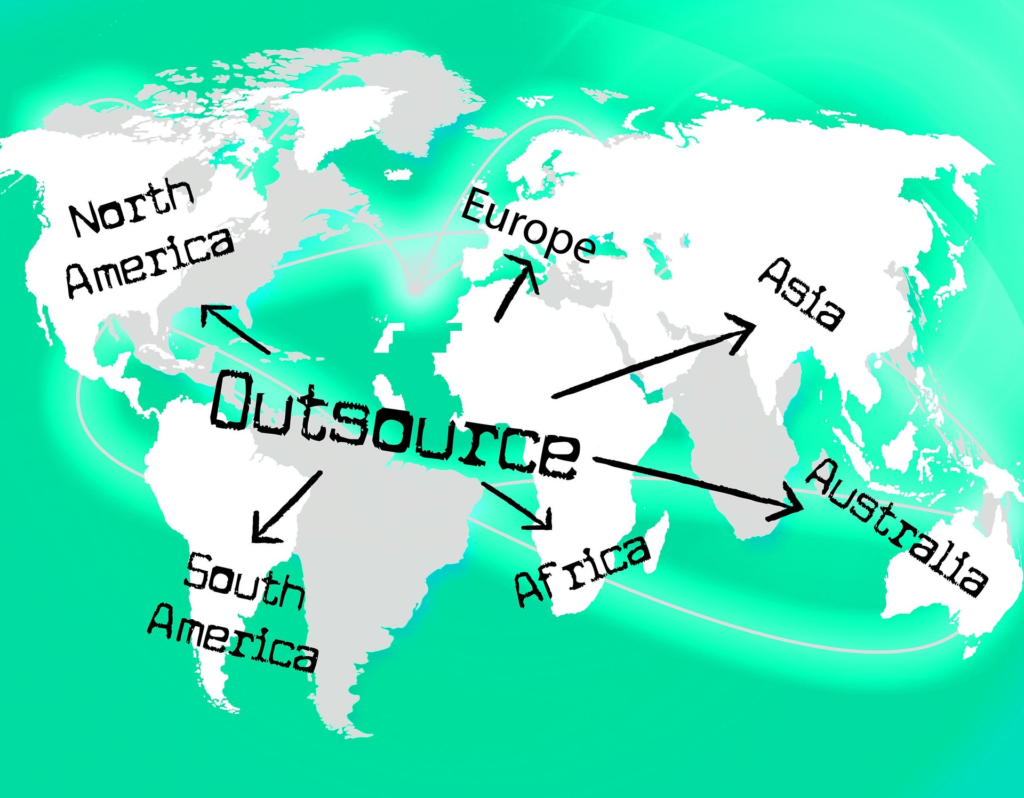Definition of outsourcing: The purchase of ready-made goods or services from other businesses rather than producing them in-house from scratch.
What is outsourcing?
In plain English, outsourcing is when a business decides to pay another company to do something, rather than do that activity itself.
Common examples of outsourcing
Here are some common examples of outsourcing:
- Outsourcing sales & marketing activities
- Paying marketing agency to research and produce an advert
- Signing up independent sales contractors to sell goods and services on a commission-only basis.
- Asking marketing agency to organise the distribution of flyers on the streets to generate awareness of an event
- Outsourcing finance and accounting functions
- Using a third-party service to calculate and process payroll
- Using a professional services firm to engage with the tax authorities and calculate tax due
- Hiring an accounting firm to keep the books of a company, such as posting journal entries to the general ledger and drafting financial statements.
- Outsourcing operations and manufacturing
- Buying a ready-made component from a supplier rather than manufacturing it in-house
- Contracting with a manufacturer to completely assemble your product for you
- Using a third party haulage company to distribute your goods to retailers and consumers

Why do companies outsource so much?
The best consulting books and management books will set out many reasons why businesses have chosen to outsource on a grand scale. Here’s a few key reasons:
To reduce cost
Outsourcing as a definition has negative connotations because it’s often linked to the practice of ‘shipping jobs overseas’.
The period from 1980 – 2020 saw many factories in developing economies close down. The production was outsourced to manufacturers based in countries with a low-labour cost.
However, taking advantage of lower labour costs in emerging markets is only one reason to outsource.
For flexibility
The largest reason for outsourcing is it allows small businesses to tap into the efficiency of big business.
Before outsourcing was common, a business would need to hire full time employees to fulfil administrative functions such as accounting, payroll, recruitment and so on.
A small business may not have the workload to make full use of an employee, whereas, by outsourcing, they can pay only for the services they actually use. This makes budgeting much easier.
Why hire a recruitment manager to hire just 5 employees per year, when instead you can pay a recruitment agency a commission on a ‘per employee hired’ basis. This means that you may pay no fees if you decide to conduct a hiring freeze. If you had hired a recruitment manager instead, their position would now be redundant.
This is a much more efficient way for the economy to organise. People can become highly specialised, and fully utilised, while individual companies only pay for what they need.
Lower capital requirements
Another aspect of flexibility is that the organisational structure of a business can remain smaller and simpler (and thus easier to manage) if ancillary services are outsourced.
This frees up time and resources to focus on the true competitive advantage of the company – what does the company do so well which generates value.
It needn’t invest capital in large offices which exist only to hold employees who aren’t directly helping the company achieve its core objective.
The downsides of outsourcing
Companies who outsource too many operational components, lose control over their product.
This is one of the fundamental reasons why large automobile manufacturers struggled to match the pace of newer electric vehicle producers. Their supply chains were so vast and engrained through existing contracts, that it required immense resources to change direction.
The supply lines for complex products (such as vehicles and large electronics) can become hugely complex and interdependent. With suppliers based further away in several different countries, it only takes one natural disaster, political event or pandemic in one location to bring production to a shuddering halt.
Furthermore, the impact of outsourcing has seen huge rises in wages in countries such as China, as demand for skilled labour begins to outstrip the once plentiful supply. This means to an erosion in the gross margin benefits that initially underpinned the outsourcing decision.
Business books with outsourcing case studies have begun to point out that we now see many cases of companies bringing manufacturing back to the UK. The decision to outsource is a finely balanced one, with many moving parts. Such decisions aren’t permanent, and therefore manufacturing jobs may return in greater numbers as the cost of goods sold of producing products in developing nations increases further still.
How is the word outsourcing used in a sentence?
“The CEO decided that outsourcing production to China might save overheads and increase profits, but it would not be worth the potential damage to the brand.”
How does the definition of outsourcing relate to investing?
Outsourcing is a key aspect of a business model, something that value investors will scrutinise before they decide to invest in the shares of a company.
Investing books and investment courses will highlight many other operational points to look out for when reviewing attractive businesses.